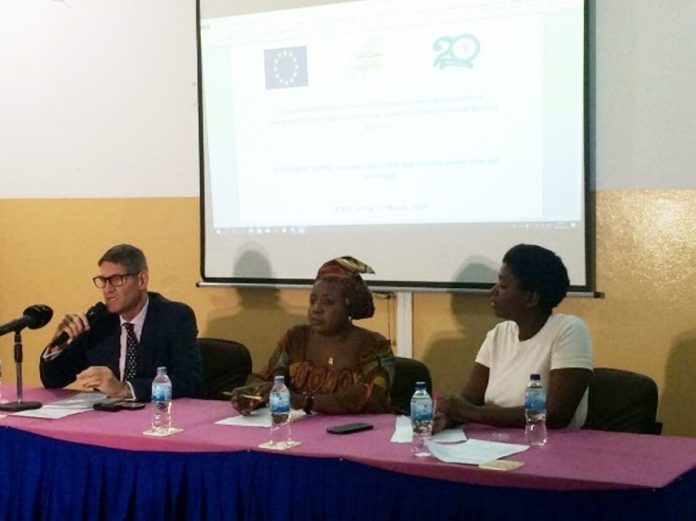By Momodou Jarju
‘‘The European Union (EU) has considered the Security Sector Reform (SSR), as one of the key elements of the current democratic transition taking place in The Gambia,’’ EU Ambassador Attila Lajos said in a statement read on his behalf by Kamashi Lumana.
Ambassador Lajos said this is the reason why the EU is deeply committed to support the SSR process, politically, technically and financially.
“The EU is using many different instruments at its disposal, to make this support effective, directly or through ECOWAS. For example, this support allows some technical assistance for the drafting of the National Security Policy, the financing of the ECOMIG mission and some support for the civilian oversight of the process,” he said.
These statements of Ambassador Lajos were read yesterday at the NaNA Conference Hall in Kanifing, where Civil Society Organizations (CSOs) kick started a 2-day training on SSR, to support their participation as independent oversight actors in the country’s security reform process.
The capacity building training is being supported by Democratic Control of Armed Forces (DCAF) in partnership with West Africa Network for Peacebuilding (WANEP), The Gambia.
Attila said SSR processes should not be restricted to the security force leaders and Government alone; pointing out CSOs, the media and parliament, should partake in the process to ensure more accountability and inclusiveness and to ensure women’s participation.
“The participation of all stakeholders in the reform process implies that national security policies and strategies, are developed through inclusive consultation processes,” he said.
The project is mainly focused on the realization of a Human Resource Assessment of some of the Security forces institutions, Ambassador Lajos said; that the results must benefit each institution and more globally, the whole sector. According to him, Gambia Armed Forces (GAF), Gambia Police Force (GPF) and the Gambia Immigration Department (GID), are currently going through this process of assessment.
“Among those EU cooperation instruments, the instrument contributing to stability and peace, has been mobilized since April 2018, to finance a project implemented by the Geneva Centre for Democratic Control of the Armed Forces (DCAF). DCAF is a very experienced organization that has facilitated, driven and shaped many SSR processes in many countries around the world. We are happy to have them on board and to benefit from their unique expertise. Technical assistance to the Gambia Government and in particular, to the National Security Adviser’s office, is another important objective of the project,” Ambassador Lajos said.
Speaking at the opening ceremony, WANEP National Coordinator Salama Njie, said SSR is a national process which aims to strengthen the effectiveness, transparency and integrity of defense and security actors and institutions, and that CSOs serve as channels through which citizens can participate in the development of public policy and provide citizen oversight.
“The involvement of CSOs in SSR is indeed very crucial in improving the safety, security and basic living conditions of the public. This fundamental objective of SSR is imperative, to enable public participation in the reform processes,” she said.
Meanwhile, a term of reference was signed between DCAF and WANEP –Gambia, to implement three activities including this 2-day CSOs’ training. The remaining two trainings or workshops to be conducted in May and June 2019 respectively, are challenges to CSOs’ participation in SSR. Participants are expected to scrutinize and report on security sector reform and formulate concrete contributions to the process after the training.
The eighteen-month European Union-funded project, aims to support Government efforts to launch a deep and inclusive SSR process, and enhance external oversight by non-state actors. The training also seeks to foster the development of in-depth knowledge and understanding of SSR processes, best practice, and methodologies to enhance democratic civilian control over the security forces.



















